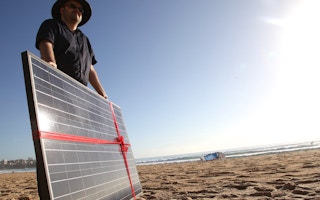More than a decade of political inaction on climate change has cost Australia “thousands of jobs and billions of dollars” according to John Hewson, former leader of the right-wing Liberal Party.
To continue reading, subscribe to Eco‑Business.
There's something for everyone. We offer a range of subscription plans.
- Access our stories and receive our Insights Weekly newsletter with the free EB Member plan.
- Unlock unlimited access to our content and archive with EB Circle.
- Publish your content with EB Premium.
Speaking at the City Talks event in Sydney’s Town Hall on Tuesday, Hewson, who is now an academic at the Australian National University, said that the political landscape in recent years has become “increasingly short-term, opportunistic and populist”; and as a result, it has not addressed big issues such as national debt, housing affordability, and climate change.
Failure to act on problems like climate change amounts to “intergenerational theft”, Hewson told the audience of almost 2,000 Sydneysiders. Today’s leaders are simply kicking the problem down the road for future generations to deal with, he said at the event, which was organised by the City of Sydney.
And given the rapidly accelerating investment and job opportunities in renewable energy—about US$241 billion was invested in renewables last year alone, roughly double the money channelled into fossil fuels—Australia has paid a heavy price for its reluctance to encourage clean energy development and low-carbon growth, Hewson said.
Having served as the leader of the opposition from 1990 to 1994, Hewson shared that as early as 1993, he had proposed that Australia slash its emissions by 20 per cent from 1990 levels by 2020; but the government went on to set a considerably less ambitious target of a 5 per cent cut from 2000 levels by 2020.
Australia has also pledged to reduce its greenhouse gas emissions by between 26 and 28 per cent from 2005 levels by 2030, but “there is absolutely no strategy for how we are going to achieve that”, Hewson said.
An obvious solution is to put a price on carbon, Hewson noted, but added that the government has rejected this option time and again. In 2003, then-Prime Minister John Howard shot down an emissions trading scheme proposal; his successor Labor politician Kevin Rudd’s government again failed to pass legislation on such a scheme in 2010.
The country’s attempt to institute a carbon tax—whereby companies would need to pay for every tonne of carbon they emitted—was also short lived. Introduced by Labor Prime Minister Julia Gillard in 2011, Australia’s carbon tax only lasted from July 2012 to July 2014 before being repealed by the newly elected Liberal government, led by Tony Abbott.
Now, Hewson said that a recent review of Australia’s electricity market by chief scientist Alan Finkel has recommended that the country set a Clean Energy Target (CET); this is a system where companies producing low-emissions electricity can sell ‘clean energy’ certificates to heavy polluters which need to reduce their emissions.
But while the government adopted 49 out of the 50 recommendations Finkel made in his report, it is still debating the CET, Hewson noted.
He added: “There is no political leadership in terms of the magnitude and urgency of the task (of addressing climate change).”
This inaction is especially worrying given that one of the goals of the Paris Agreement—the world’s first universal climate deal—is to achieve net zero greenhouse gas emissions by 2050, said Hewson.
“It’s as if politicians believe that they can wait until 2049, and suddenly get up and make the changes that are required,” he said. “Of course, that isn’t the case.”
“
Let it not be doubted that decarbonisation of global economy is exponentially accelerating, it is unstoppable, and it is absolutely irreversible.
Christiana Figueres, former executive secretary, United Nations Framework Convention on Climate Change
Stubborn optimism
However, former United Nations Framework Convention on Climate Change executive secretary Christiana Figueres, also speaking at the event, delivered a more hopeful outlook.
A self-proclaimed “stubborn optimist”, Figueres acknowledged that Australia seems to have been stuck at a crossroads of energy and climate policy for a decade now. Energy shifts are inevitably messy affairs, but “Australia is specialising in a particularly messy transition,” she added.
But even in the face of the federal government’s regressiveness, “what is extraordinarily heartening is the advance of states, territories, and cities,” said Figueres, who also serves as vice chair of the Global Covenant of Mayors for Climate and Energy, an international group of city leaders focused on climate action.
From the Australian Capital Territory’s pledge to adopt 100 per cent renewable energy use by 2020 to emissions reduction targets set by various cities around Australia, “it is clear that subnational governments have been powering forward in Australia,” said Figueres.
One important characteristic of this trend is that “cities are moving forward because it makes sense to do so,” she added. “We are creating new industries, more jobs, we are saving electricity and water, and we are getting better transport and much more liveable cities.”
The global boom in renewable energy adoption attests to this, as does the rapid speed at which countries across the world are phasing out cars with internal combustion engines in favour of electric vehicles.
Norway and the United Kingdom, for instance, have already announced that they will ban the sale of new petrol and diesel cars after 2025 and 2040 respectively, and China also indicated that is contemplating similar measures on Tuesday, said Figueres. India, too, has a target to sell only electric cars after 2030.
“Fossil fuels are on the decline, and renewable energy is on the ascent,” said Figueres.
She added: “Let it not be doubted that decarbonisation of the global economy is exponentially accelerating, it is unstoppable, and it is absolutely irreversible.”










